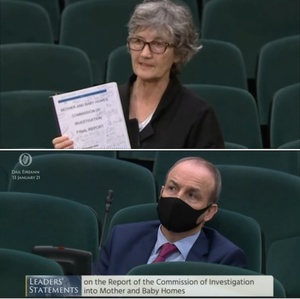
 From top: Supermac’s founder Pat McDonagh; Eamonn Kelly
From top: Supermac’s founder Pat McDonagh; Eamonn Kelly
One of the angles frequently used by Irish employers when confronted about underpaying people, is that they have heard no complaints.
Complaining is hard for Irish people, as it must be after holding your tongue for 700 years. You might say that the Republic itself is founded on a letter of complaint in the form of a Proclamation that, simply put, says, we’ve had enough of being second-class citizens.
We all know how that went down.
Irish history is littered with the bodies of people who complained. Naturally many people have learned the wisdom of silence. Irish people tend to be really, really good at not complaining. Even going so far as to stand with authority against those who do occasionally complain. As if to say: ‘Shush, you’ll get us all in trouble.’
Not Complaining
Not complaining is repeatedly relied upon by various authorities to justify the liberties it often so casually takes.
Pat McDonagh of Supermacs when he was asked on RTÉ radio recently why he charged staff for food, whether they wanted it or not, replied that the staff seem “quite happy” with the arrangement. And possibly “quite fired” if they did complain.
Minister for Employment Affairs and Social Protection Regina Doherty when asked about complaints concerning JobPath said something similar, basing the perception of “happiness” on a carefully worded satisfaction survey, the work of a private contractor, paid gazillions by the taxpayer, which helpfully delivered stats for minimal complaint and maximum satisfaction.
However, there still remained a small percentage of unusually stubborn people who complained anyway. Of these it was generally implied that such people are “trouble”, or just plain contrary, if not mentally retarded.
Diversions
Still, it’s not normal to never complain. To get around this we appear to have evolved ways of complaining without actually complaining by deflecting our attention elsewhere to complain about something else.
Most recently the Dominic Cummings case fulfilled this role by taking all the attention away from the revelation that Fine Gael’s job creation claims seem to be based on 240,000 jobs that don’t deliver a living wage. But that was okay, because the jobs in question don’t deliver a living wage to people who are apparently “quite happy”.
This habit of deflection is like a national tic. In an earlier article of mine on Aosdána, I wrote about Aosdána being largely absent from the local political scene, though some of its members were very visible in international justice campaigns that invited zero personal blowback. The old “the situation in outer Mongolia is getting bleaker,” stratagem.
It was the wrong thing to do, writing about Aosdána, since some of the members felt victimised by the attention. As one poet wildly exclaimed, You’re going to wreck it for everyone!
Really? How? By mentioning its existence? Is it in hiding? Is it like Irish austerity’s Anne Frank?
Aosdána has only 250 members, many of them elderly, and it seemed unkind of me to be harping on about it when it was clear that the artists simply wanted to be left alone.
But the institution stands as a model for arts funding, and it seems clear by now that in the ideal Ireland that Fine Gael would have, there would only be a couple of hundred funded artists, with the rest fed into the JobPath machine, which needs all the bodies it can get to keep its corporations in clover. It feeds on live tissue you see, and will take any old body: writers, musicians, butchers, bakers…
The silence of funded artists in a situation where unfunded arts practitioners are being sent through a process that is chiefly designed to degrade them, sends out the message that the established arts community are in favour of neo-liberalism’s dividing of the arts community along lines of privilege.
This is too familiar, in an Ireland too often defined along such lines.
The Rigged System
The American economist and author Robert Reich in his book, “The System: Who rigged it, How we fix it”, makes a distinction between the old paradigms of “left” and “right” and the situation we find ourselves in today, which he sees as a divide between Oligarchy and Democracy, the two sides currently featuring in running street battles in the US, thanks to real life Goldfinger himself, El Trumpo.
It is a situation where you are either with the systems of economic inequality, the Oligarchy, or you are for Democracy. The two positions are by now mutually exclusive, since, as Reich shows, the Oligarchy acquired the policy-makers a long time ago.
Anyone who goes finger-jabbing about the dangers of “socialism” is badly missing the fundamentals of the new world order.
Quietly supporting neo-liberal policy makers, like our own Fine Gael, who work primarily on behalf of business and corporations, in the hope that political circumspection will guarantee the retention of personal privileges, perpetuates the creation of social inequality through economic systems that are enriching the few at the expense of the many.
The only way to reclaim democratic freedoms lost to neo-liberal policies designed to favour business, is for people to stand unified on behalf of all who are being degraded by the neo-liberal system. Because in time, all will be degraded by that system.
Economic Apartheid
What appears to have happened in Ireland is that an elite inherited not just a republic, but a lower class perceived variously as sinners, rebels, petty criminals and uneducated labourers and skivvies, who were to be watched, managed, corrected and exploited by the elite, much as the vanquished elite had done.
It’s a kind of economic apartheid, helped in its effectiveness by a fee-paying education system that favours the middle-classes, resulting in wealth and privilege being passed on from generation to generation; as poverty and disadvantage is passed on, with unerring precision, further down the social scale.
[Independent Senator] Lynn Ruane, in an article in the Journal.ie from 2018, talks about how difficult it is to even raise the issue of class in Ireland. She writes of how a politician accused her of bringing class into everything:
“This was not the first adverse reaction to raising the issue I had received but I refuse to be made feel like I shouldn’t. The devastating impact of social class in Ireland is not an abstract concept to me and hundreds of thousands of others all over this island. People who have had their lives determined by a class system that they wore born into; by luck and luck alone.”
I met similar resistance following an article on Gerry Ryan when I mentioned, almost in an offhand way, my own working-class background. It was deeply resented. As if I was proffering some unfair gambit.
What came across very clearly to me was the middle-class assumption that disadvantage is totally about cash.
But disadvantage is about living in an environment where no one knows anyone of influence or of academic or business achievement; where university is for “them”; and where no one knows anything really of how the world works beyond finding a “boss” who’ll treat you fairly.
Robert Reich says of structural inequality:
“Today the most important predictor of someone’s future is the income and wealth of the family they are born into.”
And though Reich was speaking of the United States, all neo-liberal states are fractals of the US, and all social inequality works by the same basic globalised monetary principles of neo-liberalism, as was clearly demonstrated in 2008.
Ultimately it is up to those people who are being short-changed by the neo-liberal system to break through their ancestral reticence and start complaining against what is essentially, in Ireland, an entrenched, comfortable cartel of politics, business and landlords that has grown complacent and casually contemptuous in the silence of non-complaint.
Eamonn Kelly is a freelance Writer and Playwright.
Previously: Eamonn Kelly on Broadsheet






the alt-right won’t like this
how many Irish people are doing these low paid jobs? and why would you bother when you can get €202 and the rest on the dole. imported labour however has no SW entitlement and has to put up with. master servant relationship with their employers. so yes, people living on their wits most certainly won’t complain. music to the ears of ibec
Maybe a minimum price of a burger being €15.0 would ensure decent wages for the low paid staff
€10 .00 for a latte
Sobering thought for plumbers charging up to €75.00 per hour or solicitors carpenters etc
Still wouldn’t ensure decent wages, as there’s always greedy sillies like Pat who can never make enough.
Interesting piece as ever, Eamonn.
I think there’s a good piece in the making in that off-hand reference to Cummings providing a handy distraction. The UK media is full of total establishment sycophants and yet even they were able to do a bit of dirt-digging and call to task those in power when the absurdity of the Cummings stuff was made apparent. We saw a lot of coverage here but I wonder would similar journalistic endeavour be seen if one of our own made a similar cock-up. We seem to have a lot of journalists willing to parrot news from across the water but few seem willing to chase up on things like the handling of c19 in nursing homes, for example. Maybe we should let the lads who strung up the FAI do more current events stuff!
I think we are going to see the mother of all grim ‘jobs’ schemes once this is all done with fwiw.
In fairness the average SuperMacs supported aint the brightest.
Aosdana MUST be protected – from the removal of the Cnuas, from doing anything remotely artistic of merit, and being over 80 from being asked to wait in line like the rest of us.
Some of them are Nazis and Paedos too.
I reckon Pat McDonagh does his own ads cos he’s too cheap to pay for a voiceover artist to do it.
Yeah tasty n tempting after 10 pints when you’ll eat any ole poo.
I know why you want massive subsidies for artists – because all you do is write fiction!
…you keep repeating the unsupported claim about 240,000 low paid jobs.
…and now you are trying to suggest that “neo-liberal” Ireland (whatever that means) is the same as the USA. It’s not. Real “facts” suggest that Ireland (unlike most of the EU) has more better income equality now than previous generations. https://twitter.com/seamuscoffey/status/1257637936746704899
You’re talking poo Cian.
Great piece as always Eamon.
The seeds are sewn, beside the line in the sand.
Real artists and real activists get ready to #OccupyOffaly, right now.
Not just a county but a state of mind.
Non Fiction! No Friction!
#PowerToThePeaceful